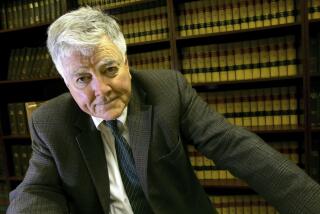Robert Strauss dies at 95; former Democratic Party chairman
Robert S. Strauss, a one-time chairman of the Democratic National Committee and a Washington insider who combined earthy Texas charm with raw political power, died Wednesday. He was 95.
A spokesman for Strauss’ Washington law firm, Akin Gump Strauss Hauer & Feld, confirmed his death but would release no other details.
A U.S. trade representative in the Carter administration, Strauss was a poker-playing, cigar-chomping, power-lunch-eating rainmaker who was so successful at recruiting mega-clients that he stopped billing by the hour in the 1970s.
“What made him unusual and attractive in a community of political social climbers was that he made no attempt to disguise his own considerable ego and freely admitted to both playing the game and enjoying it,” Hamilton Jordan, President Carter’s chief of staff, wrote in his memoirs. Once, in an interview, Strauss referred to House Speaker Tip O’Neill saying that he thought Strauss would make a good president, telling the reporter, “So do I.”
A well-dressed man with a mane of white hair and a twinkle in his eyes, Strauss was the surprise pick by a Republican president to be the U.S. ambassador to the Soviet Union as it was about to collapse. Two fellow Texans, President George H.W. Bush and Secretary of State James A. Baker III, selected Strauss on a gut instinct that sending a capitalist to a country in transition from communism might be just the ticket. It was clear, to anyone who knew him, that Strauss was hardly a diplomat — unless ego, wit and candor had suddenly become part of the job description.
“If they want a Soviet expert, they made a mistake picking me,” he said at the time. “I’m as poor an example of a Soviet expert as they could find. But if they want a winner who’s been successful at a lot of different things and understands relationships and how to help the Soviets with their terrible economic problems, then I was the right choice.”
While Strauss was in Moscow, a putsch threatened to topple President Mikhail Gorbachev. Instead of hiding in the U.S. Embassy, Strauss got in a car and went downtown, where hundreds had gathered in the streets to help Gorbachev defeat the coup. Strauss delivered a message from the president that the American people stood with Russia.
He also had an instinct for schmoozing power, no matter its source. Carter, devastated by his 1980 loss to Ronald Reagan, once quipped, “Bob Strauss is a very loyal friend. He waited a whole week after the election before he had dinner with Ronald Reagan.”
Strauss rose high enough, and lived long enough, to become one of those elder statesmen of both parties. Former Sen. Lloyd Bentsen (D-Texas) and former secretary of state Henry Kissinger were among those who called on him in moments of presidential crisis.
First Lady Nancy Reagan called Strauss at the height of the Iran-Contra scandal that tarnished the Reagan presidency. With the president’s advisors being questioned for a scheme in which the White House sold arms to Iran for the release of American hostages and then sent the proceeds to Nicaragua to fund anti-Marxist rebels, Strauss and several other veteran Washington hands were called in.
“I told the president the truth,” Strauss recalled, advising Reagan to dismiss all the aides who had touched the scandal. “It’s very tough to tell a president things he doesn’t want to hear, and he didn’t take my advice.” Later, with the controversy flaring out of control, Reagan dismissed Chief of Staff Donald Regan and replaced him with former Tennessee Sen. Howard Baker, a Strauss friend.
Born Oct. 19, 1918, in Lockhart, Texas, Strauss was the son of a German immigrant who aspired to be a concert pianist. Instead, after landing in New York, Charles Strauss took a job as a traveling piano salesman. During a trip to Texas, he married Edith Schwarz, and the two opened a dry goods store and raised two children, Robert and Ted, in Stamford, Texas.
At the University of Texas, Robert Strauss earned a bachelor’s degree and a law degree. Along the way he befriended John Connally, the student body president who later became governor of Texas, and helped Travis B. Dean win a seat in the Texas Legislature. “He got elected, and I had a job in the state Capitol,” Strauss recalled in an interview years later.
After graduating from law school in 1941, Strauss married his college sweetheart — Helen Jacobs, daughter of a wealthy Dallas businessman — and went to Washington to work for the Federal Bureau of Investigation.
At the end of World War II, he and another chum from college, Richard Gump, opened a law office in Dallas. Now known as Akin Gump Strauss Hauer & Feld, the law firm became a powerhouse with more than 1,000 attorneys and advisors in 14 offices in the United States, Europe and Asia. Often listed among the nation’s top 20 law firms, Akin Gump represented clients — sometimes whole countries — on issues as diverse as corporate securities and international trade.
For his part, Strauss always gravitated to the political end of the business. He was a strategist and chief fundraiser for Connally during his gubernatorial race in 1962, and Connally rewarded him with posts on the Texas Banking Commission and as a Democratic National Committee member from Texas.
Connally also asked Strauss to work on Lyndon Johnson’s reelection campaign in 1964, and he took off a month from his law practice to run the Florida and New Jersey primaries. “From then on I began to do things nationally,” he later recalled. In 1968, Connally put him on the Democratic National Committee. Within two years, party elders tapped him to be treasurer.
After Sen. George McGovern (D-S.D.) lost the race for the White House to President Nixon in 1972, a demoralized party turned to Strauss as chairman. By the time Carter ran for office four years later, Strauss had engineered a restoration — getting both wings of the far-flung base to appear on the same stage, from civil rights leader Coretta Scott King to former Alabama Gov. George Wallace, in a show of unity.
Along the way, he established his own wealth, investing in real estate, buying a radio station and benefiting from his law practice where, the National Journal once noted, he was “the heart and soul of the firm as well as its chief rainmaker and clout merchant.”
In those days, Washington was still reeling over Strauss’ virtuoso performance in winning his law firm $8 million in fees from both sides, hired by Matsushita Electric Industrial Co. to help in a takeover of entertainment giant MCA, who also hired him. Bush joked about it at a Gridiron dinner, saying that Strauss had written columnist Ann Landers for advice “and she asked me to read her response. ‘Dear Washington Wheeler Dealer. Yes. Take the money from both clients.’”
He was known to have a temper — needling reporters before publication, warning them against hatchet jobs — and he was known to use his influence to his advantage. A year after he left Russia as ambassador, Akin Gump announced the firm was opening an office in Moscow. Strauss took some hits. “It’s clearly a case of a public official later benefiting from his public service,” said Charles Lewis of Center for Public Integrity.
But Strauss resisted the inference that he had done anything wrong, blasting a journalist for writing that he was a fixer. “I detest that word,” he said. “It sounds cheap.... I don’t know how to fix anything. Hell, I’ve never even fixed a traffic ticket. What I do is help make the government work.”
He understood that the government worked best as a social institution. Asked once if he would ever retire, Strauss shook his head emphatically. “You don’t know how quickly the telephones can stop ringing and the invitations stop coming,” he said.
Mostly, he was addicted to the work and to the role. In an interview with the Dallas Morning News, Strauss said, “Someone asked me the other day what I liked best about my public career and the things I’ve done all my life. And I said, ‘Just quote me as saying, ‘I liked the whole damn deal.’ ”
A complete list of survivors was unavailable.
Neuman is a former Times staff writer.
More to Read
Start your day right
Sign up for Essential California for the L.A. Times biggest news, features and recommendations in your inbox six days a week.
You may occasionally receive promotional content from the Los Angeles Times.






